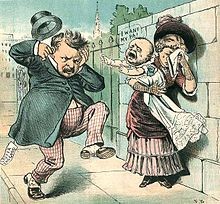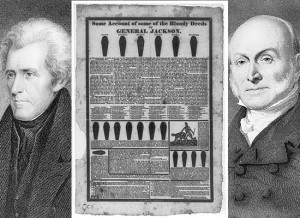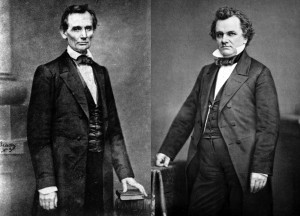As the 2022 midterm elections draw ever nearer, the slurs and mud-slinging are picking up. Liberals are calling conservatives domestic terrorists and white supremacists. Conservatives are calling liberals leftist lunatics and depraved communists.
Pretty nasty stuff, right?

Not really, not when you look at the kind of mudslinging gutter politics that existed in the 19th Century and the early part of the 20th Century.
I happened upon some of these gems of abuse when I was conducting research for my Finding Billy Battles trilogy.
For example, as I was looking for information about President William McKinley and Woodrow Wilson, I discovered modern politicians have a long way to go to best their counterparts from 100 and 200 years ago when it comes to personal attacks and world-class mudslinging.
Just take a look at some of these zingers:
In 1898, while serving as Assistant Secretary of the U.S. Navy, Theodore Roosevelt became convinced that President William McKinley was a “vacillator.” He said of the President, “McKinley has no more backbone than a chocolate eclair.” Ironically, in 1900 Roosevelt became McKinley’s Vice Presidential Running Mate.
Reminds me of the relationship between Joe Biden and Kamala Harris. During the Democratic Presidential debates, Harris implied that Biden was a racist for opposing busing decades ago.
During the election of 1884 between Democrat Grover Cleveland and Republican James G. Blaine, Blaine’s camp jumped on the fact that Cleveland had sired a child out of wedlock (obviously a much greater transgression then than now).
The Blaine camp came up with this little ditty to celebrate Cleveland’s indiscretion: “Ma, Ma, Where’s My Pa? Gone to the White House, Ha ha ha.”
Ma, Ma, Where’s My Pa?
Not to be outdone, Cleveland’s handlers responded with this little ode: “Blaine, Blaine, James G. Blaine, the Continental Liar from the State of Maine.”
Turning the clock back even further, we see that the 1800 campaign between Thomas Jefferson and John Adams was no walk in the political park.
In that election (the only in American history where a vice-president ran against a sitting president), Jefferson called Adams a “repulsive pedant” and a “hideous hermaphroditical character which has neither the force and firmness of a man nor the gentleness and sensibility of a woman.”
Adams responded by asking voters who might be considering voting for Jefferson: “Are you prepared to see your dwellings in flames… female chastity violated…children writhing on the pike? Great God of Compassion and Justice, Shield my Country from Destruction.”
After that election, Congress passed the 12th Amendment to the Constitution, which mercifully changed the rule that the presidential candidate who got the second most votes would automatically be vice-president. From then on, each presidential candidate picked a running mate, thereby avoiding the prospect of a sitting president having to run against his own vice-president.
Move forward to 1828 and what many consider the most contentious, nastiest presidential campaign in American history–Andrew Jackson versus John Adams’s son, incumbent President John Quincy Adams.
Adams, of the Federalist party, fired the first shot in this vicious contest, saying that Jackson was a murderer, had the personality of a dictator, and was too uneducated to be president (they claimed he spelled Europe ‘Urope’).
And they didn’t stop there. The Adams camp decided it wasn’t enough to go after Jackson. They would attack his wife, Rachel, and his mother too.
Jackson & Adams
Jackson’s wife, the Adams camp said, was a prostitute.
Before marrying Jackson, Rachel had been in an abusive marriage with a man who eventually divorced her. In the early 19th Century, divorce was still considered a scandalous affair. The Federalists called Rachel a “dirty black wench” and a “convicted adulteress” who was prone to “open and notorious lewdness.”
Jackson’s handlers responded by charging that when Adams was serving as the ambassador to Russia, he had sold his wife’s maid as a concubine to the czar of Russia. They branded Adams a “Pimp to the Coalition,” a reference to the Russian government.
Jackson won 642,553 votes to Adams’ 500,897.
Later in the 19th century, Tennessee Congressman Davy Crockett accused Martin Van Buren of secretly wearing women’s clothing: “He is laced up in women’s corsets.”
James Buchanan, who had a congenital condition that caused his head to tilt to the left, was accused of having unsuccessfully attempted to hang himself.
During the 1868 campaign, newspapers called Ulysses S. Grant, the general who led the Union to victory in the Civil War, “brainless as his saddle,” a “man of vile habits,” and a “drunkard.” He was elected twice.
In the election of 1876, Democrats claimed Rutherford B. Hayes shot and wounded his own mother in a drunken “fit of insanity.”
Not even Republican Abraham Lincoln, the great emancipator, was immune from slinging the sludge and being whacked with it.
In the 1860 election campaign, Stephen Douglas called Lincoln a “horrid looking wretch, sooty and scoundrelly (sic) in aspect, a cross between the nutmeg dealer, the horse swapper and the night man” (whoever or whatever the night man is).
And he didn’t stop there. Lincoln, he said, “is the leanest, lankest, most ungainly mass of legs and arms and hatchet face ever strung on a single frame.” And, he continued, he has stinky feet.
Lincoln & Douglas
Wow, how low can you go?
Lincoln responded by calling Douglas, who was only 5-feet 4-inches tall, the “little giant.”
“Douglas is about five feet nothing in height and about the same in diameter the other way,” Lincoln said.
When Douglas left Washington D.C. for New York City on the train, he told the press he was taking a leisurely trip to visit his mother when in fact, he was going on the campaign trail.
Lincoln and his supporters took note of the fact that it took him more than a month to get to New York and even put out a “Lost Child” handbill that said Douglas: “Left Washington, D.C. sometime in July, to go home to his mother…who is very anxious about him. Seen in Philadelphia, New York City, Hartford, Conn., and at a clambake in Rhode Island. Answers to the name Little Giant. Talks a great deal, very loud, always about himself.”
During Lincoln’s reelection campaign of 1864, his Democrat opponent George McClellan described Lincoln as: “nothing more than a well-meaning baboon!”
More recently, in 1966, President Lyndon B. Johnson mocked his political foe, U.S. House Minority Leader Gerald R. Ford, who once played Center on the University of Michigan Football team, saying: “Ford’s a nice guy, but he played too much football with his helmet off.”
It is only my opinion, but I think the folks running for president today are amateurs when it comes to venting their gall, slinging the slime, and generally putting their opponents’ noses out of joint. They could all take a few lessons from history.
As Lord Chesterfield once said: “An injury is much sooner forgotten than an insult.”
[If you enjoyed this post, please consider subscribing to ForeignCorrespondent and tell your friends to subscribe. IT’S FREE! WHAT A DEAL! If you’ve received this from a friend and would like to be added to our distribution list for future blog posts, please enter your email address in the sign up for notifications box at https://ronaldyatesbooks.com/category/foreign-correspondent You can also find my commentaries on the American Free News Network at https://afnn.us. And please feel free to comment. WE LOVE COMMENTS!]





Another great article, Ron. PS— The term “nightman” was descriptive of a worker who dug out and removed human excrement from privies and cesspits. They likely did have stinky feet.